Sign Shop Profile: Loudmouth Printhouse
by all | 3 April 2013 8:30 am
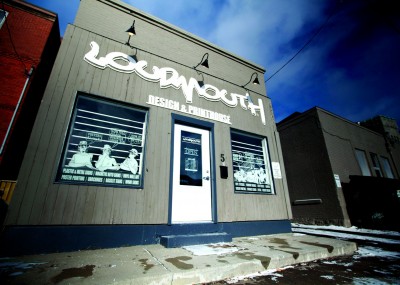 [1]By Peter Saunders
[1]By Peter Saunders
Early last year, the work of Ottawa-based Loudmouth Printhouse gained international attention. One of its wall murals was the monthly People’s Choice winner in printer/cutter supplier Roland DGA’s Creative Awards contest, as voted for by website visitors.
Named ‘The Devil Inside,’ the mural recreated an illustration commissioned by Upfront, a magazine based in Windsor, Ont., and drawn by artist George Rizok. It was scanned and vectorized using graphic design software developed by Ottawa-based Corel. Once the lines were cleaned up, the image was reproduced on a series of panels, using a 610-mm (24-in.) Roland cutter.
Each colour was cut, weeded, aligned and applied separately. It took 13 hours to assemble the 19 panels in seven colours of vinyl. The end result was a 4 x 3.8-m (13 x 12.5-ft) wall graphic.
Corel also highlighted Loudmouth owner Anis El Kassem on its website with blog posts before and after the Roland award, discussing how the software, cutter-plotters and other tools had allowed him to serve a diverse market from a modest base of operations.
“Being independent is the most important aspect of being an entrepreneur,” El Kassem told Corel in an interview. “I have the freedom to decide my hours based on selfish needs. I want to work a little, then go home and spend time with my family.”
Growing pains
A University of Windsor graduate, El Kassem was working evenings as a waiter when he began printing and cutting vinyl in his Ottawa basement eight years ago.
“It was mostly self-taught,” he says. “I did a lot of Googling to learn. I also had a friend in Windsor who ran a sign shop, so he gave me some tips.”
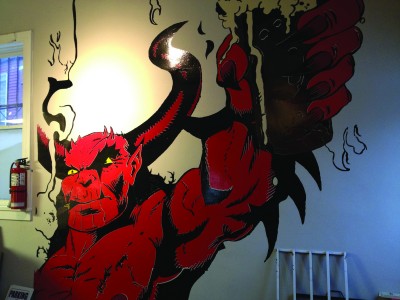 [2]He bought two Roland vinyl cutters and specialized in small decals and wall art.
[2]He bought two Roland vinyl cutters and specialized in small decals and wall art.
“My infant son was hanging from me in a Baby Bjorn carrier,” he says. “He would sleep through the whole thing!”
Having not yet branded his business as Loudmouth Printhouse, El Kassem sold to customers through 10 different online storefronts, including eBay and Etsy. The majority of his work in the early days was wall art for people’s homes, especially their children’s rooms and washrooms, while some other projects were for offices.
“I had hundreds of designs my customers could choose from,” he explains. “I would start work early in the morning, create six or seven projects, then drive to a Federal Express (FedEx) office to ship them. And I would ship anywhere, including the U.S. and overseas. Then I was done for the day!”
Three years ago, however, with the volume of orders increasing, he realized he would need more space to comfortably work on customized wall murals.
“My head was hitting the basement ceiling,” he says, “and the concrete walls and floor weren’t very forgiving. I envisioned a shop that would provide a larger workspace.”
Once he found a suitable 130-m2 (1,400-sf) two-level retail space in Ottawa’s Centretown neighbourhood, which had seen a recent construction boom, he discussed it with his wife. The timing seemed to be perfect, as their son was about to start daycare.
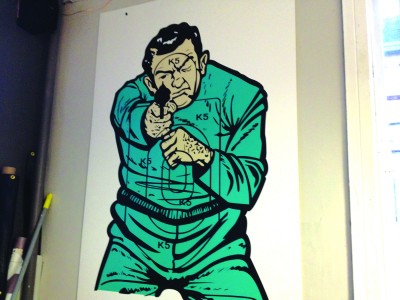 [3]“My plan was not for the space to be open to the public, since I would continue to focus on selling online,” El Kassem says, describing the shop as a small, garage-like box on a residential road near a main street, “but as it turned out, after I was ‘inaccessible’ for the first couple of weeks, I started to get walk-in customers! And a lot of people wanted to come in to ask questions before ordering. At the same time, shipping artwork in heavy tubes kept getting more expensive. So, as my local presence took off, I eliminated my online business activities.”
[3]“My plan was not for the space to be open to the public, since I would continue to focus on selling online,” El Kassem says, describing the shop as a small, garage-like box on a residential road near a main street, “but as it turned out, after I was ‘inaccessible’ for the first couple of weeks, I started to get walk-in customers! And a lot of people wanted to come in to ask questions before ordering. At the same time, shipping artwork in heavy tubes kept getting more expensive. So, as my local presence took off, I eliminated my online business activities.”
The nature of his printed output also changed. Customers began to request signs, banners and vehicle decals. With his focus on wall murals, he said no at first, but soon relented and expanded his shop’s offerings to match demand.
“It changed pretty quickly,” he says.
A full-time pursuit
After the first year running the shop, El Kassem quit waiting tables. His last shift was on New Year’s Eve at the end of 2010.
“I didn’t want to be a waiter anymore,” he says. “I wanted to focus aggressively on this business full-time. After I quit, I worked at the shop by myself until March 2011, then took on a graphic design student through a local college co-op program. I ended up hiring her after the co-op term ended and she stayed here for a year. After she left, I hired another graphic designer, although like me, he does a bit of everything—design, print, cut, weed and install.”
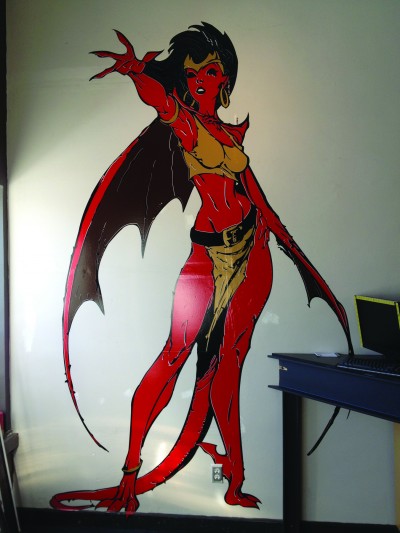 [4]For a relatively unassuming, two-person business, the name ‘Loudmouth Printhouse’ may seem like a misnomer, but it represents the spirit of much of its work today.
[4]For a relatively unassuming, two-person business, the name ‘Loudmouth Printhouse’ may seem like a misnomer, but it represents the spirit of much of its work today.
“Before the shop opened, I was going to name it Tweak Printhouse, since I focus a lot on tweaking my customers’ image files to improve the final results,” he says, “but it changed when I started to get more interest from businesses. I like the idea of ‘Loudmouth’ representing marketing with bright, colourful signs or other media.”
Loudmouth has produced such signs for restaurants, hair salons, yoga studios and other small, public-facing businesses. This niche market has been a good fit for the shop’s capabilities.
“All of us small-business owners know each other,” says El Kassem. “I’ve had real-estate agents ask me about signs, but I can’t handle the volumes they’re looking for. There’s also a lot of government-commissioned work available here in Ottawa, but there’s too much red tape to go through. They want job quotes submitted on proper letterhead. That’s not how I work.”
Besides the walk-in customers and small-business referrals, Loudmouth’s services are marketed through Twitter and Facebook postings that showcase its work, along with a handful of print ads. Together, it has been sufficient to bring in a steady stream of work.
In a given week, Loudmouth will handle between 35 and 40 jobs, including roughly 10 sandwich boards or other signs, 10 large-format backlit graphics and 20 custom die-cut decals. Wall murals are commissioned about once a month.
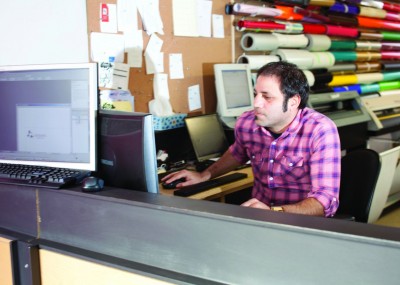 [5]“Anytime we hear someone we know is having a baby, I figure we have six months to come up with something cool for their room!” says El Kassem. “I like the amount of work we get. The business could maybe become a little bigger, but I can’t fit more staff here.”
[5]“Anytime we hear someone we know is having a baby, I figure we have six months to come up with something cool for their room!” says El Kassem. “I like the amount of work we get. The business could maybe become a little bigger, but I can’t fit more staff here.”
In addition to the pair of cutters, the shop is equipped with two heat presses for T-shirt graphics, a Xerox digital press for business cards, postcards and smaller signs and a screen press for the occasional screenprinted posters.
“When we do screenprinting, it’s usually two- or three-colour work on artist’s paper to promote a local band’s concert,” says El Kassem. “We’re not going to screenprint 500 signs for an election, but there’s a niche market for screened images because they’re cool. And people who really like it are willing to pay for it. A four-colour manual press is not going to be cheaper to use than a digital printer!”
Loudmouth installs its own graphics indoors and occasionally outdoors, but avoids heavy-duty sign installation work.
“When I first opened in this space, there was a furniture store in Quebec that wanted a 6 x 13.7-m (20 x 45-ft) backlit sign, which would be 7.6 m (25 ft) above the ground,” says El Kassem. “I stressed over it for days while I cut panel after panel. I contacted a boom truck rental company, but in the end went with another print shop that could install the piece. It took them a day and a half. That’s when I realized I didn’t want to go too large and overextend myself. I’ve made banners that jet out from buildings, but I always get someone else to install them.”
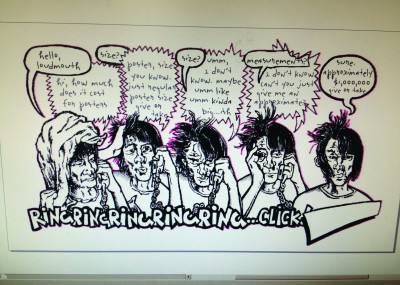 [6]The personal touch
[6]The personal touch
Happy with the niche he has found for Loudmouth, El Kassem does not worry about competition from other sign or print shops.
“The stuff we do is so customized,” he says. “A lot of our efforts are invisible to the customer, in that we’ll take whatever files we’re given and then fix them. There is a lot of back-end correction work. The customer is oblivious to this process, even if the original file is garbage.”
This personal touch extends from software-based design to hardware-based production.
“We don’t have a computer numerical control (CNC) router, but we’ll jigsaw an interesting shape for a sandwich board,” says El Kassem, “and we’ll apply polyester vinyls to aluminum sign blanks as a substrate for outdoor graphics. We don’t do any rush-type work.”
With the shop’s current pace, workload and market awareness, he says he’s very happy with what the business has become since its roots in his basement.
“Online was impersonal and I never saw the work,” he says. “Now I can drive through town and say, ‘I put that up!’”
- [Image]: http://www.signmedia.ca/wp-content/uploads/2014/02/building.jpg
- [Image]: http://www.signmedia.ca/wp-content/uploads/2014/02/IMG_0188.jpg
- [Image]: http://www.signmedia.ca/wp-content/uploads/2014/02/IMG_0186.jpg
- [Image]: http://www.signmedia.ca/wp-content/uploads/2014/02/IMG_0362.jpg
- [Image]: http://www.signmedia.ca/wp-content/uploads/2014/02/me.jpg
- [Image]: http://www.signmedia.ca/wp-content/uploads/2014/02/5.jpg
Source URL: https://www.signmedia.ca/profile-loudmouth-printhouse/